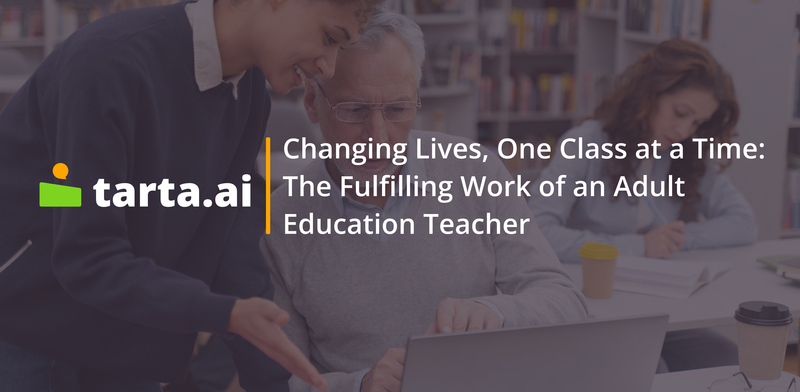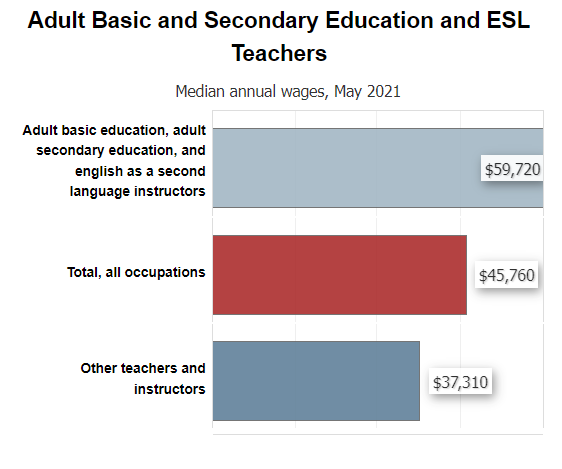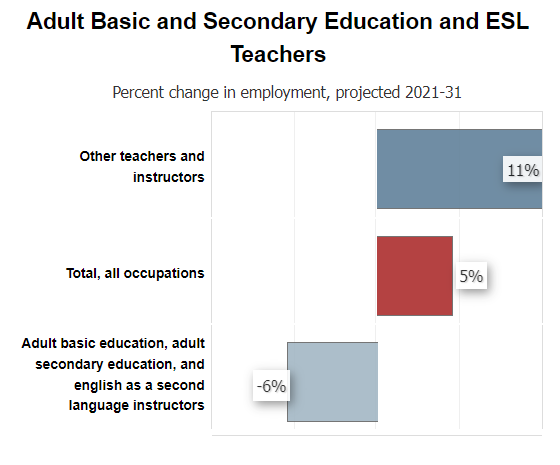Changing Lives, One Class at a Time: The Fulfilling Work of an Adult Education Teacher

"You are never too old to set another goal or to dream a new dream." - C.S. Lewis
Job Description
Adult education teachers play a crucial role in providing education and training to adults who want to learn new skills, enhance their knowledge, or pursue further education. As a result, this job is highly rewarding and fulfilling for those who enjoy teaching and working with adult learners.
General Information
Adult education teachers work with a diverse range of learners, including those who are seeking to advance their careers, immigrants seeking to learn English, or adults who did not have the opportunity to complete their education earlier in life. They typically teach classes in community centers, vocational schools, and other adult education programs.
Requirements
To become an adult education teacher, candidates must have a minimum of a bachelor's degree, preferably in education or a related field. Additionally, they must have a valid teaching license or certification. Some states may require a master's degree or additional certifications, depending on the specific program and state regulations.
Main Responsibilities
Adult education teachers are responsible for planning, preparing, and delivering instructional materials to adult learners. They create lesson plans that are engaging, effective, and meet the needs of their students. They also assess the progress of their students and provide feedback on their performance. Other main responsibilities include:
- Conducting classes in a variety of subjects, such as reading, writing, math, science, and English language learning.
- Developing and implementing a curriculum that meets the needs of adult learners.
- Assessing and evaluating the progress of students, including grading assignments and providing feedback.
- Providing students with academic and personal support, including referrals to other resources as needed.
- Keeping accurate records of student progress and attendance.
- Collaborating with other teachers, administrators, and staff to create a positive and effective learning environment.
Additional Duties
In addition to their main responsibilities, adult education teachers may be responsible for a range of additional duties, including:
- Providing counseling and support to students who may be experiencing personal or academic difficulties.
- Recruiting students and promoting adult education programs to the community.
- Attending professional development workshops and conferences to stay up-to-date on teaching methods and best practices.
- Participating in program planning and evaluation.
- Managing classroom resources and materials, such as textbooks, technology, and equipment.
Skills
Hard Skills | Soft Skills |
Knowledge of educational theory and practice | Strong communication skills, both written and verbal |
Proficiency in subject matter, such as reading, writing, math, or English language learning | Patience and empathy for adult learners who may have unique needs and challenges |
Familiarity with educational technology and software | Adaptability and flexibility to adjust instruction based on student needs |
Ability to develop curriculum and lesson plans | Organizational and time-management skills to manage multiple responsibilities effectively |
Assessment and evaluation of student learning | Collaboration and teamwork skills to work effectively with colleagues and students |

Photo: Freepik
Salary
The average salary for adult education teachers in the United States is around $59,000 per year, with a range of $35,000 to $96,000 per year. However, salaries can vary significantly depending on the state, with some states offering higher salaries than others.
According to the Bureau of Labor Statistics (BLS), the top-paying states for adult education teachers are New York, California, and Massachusetts, with average salaries ranging from $65,000 to $70,000 per year. States with the lowest average salaries for adult education teachers include Arkansas, Alabama, and Mississippi, with average salaries ranging from $38,000 to $43,000 per year.
Factors that Influence Earnings
Several factors can influence the earnings of adult education teachers, including:
- Education Level: Adult education teachers with a master's degree or higher may earn a higher salary than those with only a bachelor's degree.
- Experience: The more experience an adult education teacher has, the higher their salary may be.
- Location: Salaries can vary based on the cost of living and demand for adult education teachers in different states and regions.
- Job Responsibilities: Adult education teachers who have additional responsibilities, such as program coordination or curriculum development, may earn a higher salary.
Ways to Improve Earnings
There are several ways that adult education teachers can improve their earnings, including:
- Pursue higher education: Obtaining a master's degree or higher can increase earning potential.
- Gain experience: Gaining experience through teaching, program coordination, or other related roles can lead to higher salaries.
- Seek out higher-paying positions: Adult education teachers may consider seeking out higher-paying positions in different states or regions or with different employers.
- Pursue additional certifications: Obtaining additional certifications, such as a teaching certificate in a specific subject area, can increase earning potential.
History lesson:
In the 1960s and 1970s, adult education programs focused on promoting social justice and civil rights, as well as providing education and training for disadvantaged and marginalized communities.
Additional Benefits
- Health Insurance: Many employers offer health insurance benefits to their full-time employees, which can help cover medical expenses and provide access to healthcare services.
- Retirement Plans: Adult education teachers may be eligible to participate in employer-sponsored retirement plans, such as 401(k) plans or pensions, which can help them save for retirement.
- Professional Development Opportunities: Employers may provide opportunities for adult education teachers to attend conferences, workshops, or training sessions to enhance their skills and knowledge.
- Flexible Schedules: Some adult education programs may offer flexible schedules, such as evening or weekend classes, which can allow teachers to balance work with personal obligations or other commitments.
- Job Stability: Adult education is a growing field, with increasing demand for qualified teachers, which can provide job stability and security for those in the profession.

Source: U.S. Bureau of Labor Statistics
Job Environment
Adult education teachers work in a variety of environments, including:
- Adult Education Centers: Many adult education teachers work in adult education centers, which may be run by local school districts or community organizations. These centers offer classes and programs to help adults earn their high school diploma, learn English, and develop job skills.
- Community Colleges: Some adult education teachers work in community colleges, teaching courses that can lead to associate's degrees or job certifications.
- Workplaces: Some companies offer on-site training programs for their employees, which may be taught by adult education teachers.
- Correctional Facilities: Adult education teachers may work in correctional facilities, providing education and training to inmates.
Tools and Resources
Tools and Resources | Description |
Textbooks and Workbooks | Used to support curriculum and provide structured learning materials |
Classroom Supplies | Includes whiteboards, markers, projectors, and other materials used to engage students and deliver lessons |
Learning Management Systems | Online platforms used to deliver and manage course materials |
Audio-Visual Materials | Includes videos, podcasts, and other media used to enhance understanding and engagement |
Assessment Tools | Used to evaluate students' knowledge and understanding of course material |
Online Learning Platforms | Includes platforms like Khan Academy or Coursera, used to provide students with additional resources and learning opportunities |
Community Resources | Includes public libraries and local organizations used to support students' learning |
Collaborative Learning Tools | Includes group projects and discussions, used to encourage collaboration and knowledge sharing among students |
Work Schedule
The work schedule for adult education teachers can vary depending on the setting they work in. Many adult education teachers work part-time, and their schedules may be flexible, with classes scheduled in the evenings or on weekends to accommodate students who work during the day. Adult education teachers who work in traditional school settings or community colleges may have a more structured schedule, with classes scheduled during regular school hours.
Did you know?
Adult education teachers often use non-traditional teaching methods, such as group discussions, case studies, and real-world examples to engage and challenge their students.
Education
To become an adult education teacher, individuals typically need a bachelor's degree, although a master's degree or higher may be required for some positions.
Bachelor's Degree
A bachelor's degree is typically the minimum educational requirement for becoming an adult education teacher. A bachelor's degree program in adult education may cover topics such as teaching methods, curriculum development, and adult learning theory. In addition to coursework, many programs require students to complete a student teaching or internship experience.
Master's Degree
A master's degree in adult education may be required for certain positions, such as teaching in community colleges or teaching advanced-level courses. A master's degree program may cover topics such as instructional design, program evaluation, and educational technology. Some programs may also require students to complete a research project or thesis.
Ph.D.
A Ph.D. in adult education is not typically required for most adult education teaching positions, but it may be necessary for those interested in pursuing research or academic careers. A Ph.D. program in adult education may involve advanced coursework in adult learning theory, educational research methods, and program development. Students in a Ph.D. program may also be required to complete a dissertation.

Photo: Freepik
Time Frame of Education Process
The time frame for completing the education process to become an adult education teacher can vary depending on the degree program and individual circumstances. A bachelor's degree typically takes four years to complete, while a master's degree may take an additional two years or more. A Ph.D. program can take anywhere from four to seven years to complete.
Professional Associations
For adult education teachers, joining a professional association can provide opportunities to connect with colleagues, stay up-to-date on industry developments, and access resources to improve their teaching practice.
Two of the largest professional associations for adult education teachers in the United States are the American Association for Adult and Continuing Education (AAACE) and the National Association for Adult Education (NAEA). These organizations offer a range of resources for members, including professional development opportunities, research publications, and advocacy for adult education policy.
Here are a few more professional associations that adult education teachers can consider joining:
- Commission on Adult Basic Education (COABE): COABE is a professional organization for adult educators that focuses on improving the quality of adult basic education programs and advocating for adult learners.
- Teachers of English to Speakers of Other Languages (TESOL) International Association: TESOL is an organization that supports professionals who work with English language learners. It provides resources and professional development opportunities to help educators improve their teaching practices.
- Association for Talent Development (ATD): ATD is a professional association for professionals in the talent development field, including those who work in adult education. It offers resources and networking opportunities to help professionals stay up-to-date on the latest trends and best practices.
- National Association of Workforce Development Professionals (NAWDP): NAWDP is a professional organization for workforce development professionals, including those who work in adult education. It provides resources and training to help professionals improve their skills and serve their clients more effectively.
- Association for Continuing Higher Education (ACHE): ACHE is a professional organization for professionals who work in continuing education at the college and university level. It provides resources and networking opportunities to help professionals improve their programs and services.
Licenses and Certifications
In some states, adult education teachers who work in public schools may need to obtain a teaching license, which typically requires completion of a state-approved teacher education program, passing a certification exam, and meeting other state-specific requirements.
In addition, adult education teachers may choose to obtain certifications to demonstrate their expertise and improve their job prospects. One such certification is the Certified Adult Education Professional (CAEP) credential, offered by the AAACE. The CAEP certification requires completion of a minimum of 120 hours of professional development in adult education and passing a certification exam.
Other certifications that may be relevant for adult education teachers include the Certified Online Learning Facilitator (COLF) credential, offered by the International Association for Continuing Education and Training (IACET), and the Certified Training and Development Professional (CTDP) credential, offered by the Institute for Performance and Learning.
Important:
The US Department of Education has announced five finalists in the Future Finder Challenge, which aims to reimagine career navigation for adult learners. The finalists will receive $50,000 to develop their prototypes and participate in a six-month virtual accelerator program. This challenge aligns with the Department's goal of providing every student with a path to college and career.
Career Paths
Adult education teachers have a range of career paths and opportunities for professional development within their field. Some ways of career development include pursuing advanced degrees or certifications, gaining experience in specific subfields or specializations, and taking on leadership roles within their organizations.
Subfields
Subfield | Description |
Literacy and Basic Skills Education | Provides instruction in reading, writing, and math skills to adults who have not completed high school or who have limited literacy skills. |
English as a Second Language (ESL) Education | Provides instruction in English language skills to adult learners who are not native English speakers. |
Vocational Education | Provides training and instruction in specific job skills or trades, such as welding, nursing, or computer programming. |
Adult High School Education | Provides adult learners with the opportunity to complete their high school education and earn a diploma. |
Continuing Education | Provides educational opportunities for adults who want to continue their learning and personal development, such as community education courses or professional development workshops. |
Community Education | Provides educational opportunities to support community development and engagement, such as courses on community organizing or civic engagement. |
Correctional Education | Provides educational opportunities to incarcerated individuals in prisons and jails, including basic literacy skills and vocational training. |
Older Adult Education | Provides educational opportunities specifically designed for older adults, such as lifelong learning programs and courses on healthy aging. |
Distance Education | Provides educational opportunities for adult learners who are not able to attend traditional classroom-based courses, often using online or remote learning technologies. |
Workplace Education | Provides educational opportunities for employees in the workplace, such as job-specific training or leadership development programs. |
Specialization
Adult education teachers may also choose to specialize in certain areas of instruction, such as technology-assisted instruction or experiential learning. Specializing in a specific area can provide opportunities for career advancement and higher salaries, as well as allowing teachers to develop expertise in areas of personal interest.

Photo: Freepik
Alternative Careers and Similar Jobs
In addition to teaching, adult education teachers may pursue alternative careers or similar jobs in related fields. For example, they may work in curriculum development, program administration, or instructional design. They may also work in community organizations or government agencies focused on education or workforce development.
Here are some alternative careers and similar jobs related to adult education:
- Education Coordinator: Develops and coordinates educational programs for organizations, such as non-profits or government agencies.
- Instructional Designer: Develops educational materials and curriculum for a variety of settings, including corporate training programs and online courses.
- Program Administrator: Manages adult education programs, including budgeting, staffing, and overseeing day-to-day operations.
- Corporate Trainer: Designs and delivers training programs for employees of companies, often focused on job-specific skills or professional development.
- Community Outreach Coordinator: Develops and manages programs aimed at increasing community engagement and education, often for non-profit organizations or government agencies.
- Curriculum Specialist: Develops and designs curricula for educational programs, often focusing on specific subject areas or student populations.
- Educational Consultant: Provides guidance and expertise on educational policies, practices, and program development to organizations or government agencies.
- E-Learning Specialist: Designs and delivers online educational programs, often using technology-based tools and resources.
- Academic Advisor: Provides guidance and support to adult learners pursuing post-secondary education or career development.
- Grant Writer: Develops and writes grant proposals to secure funding for educational programs and initiatives, often for non-profit organizations or government agencies.
Job Market
According to the Bureau of Labor Statistics (BLS) the employment of adult basic and secondary education and ESL Teachers is projected to decline 6% from 2021 to 2031. This decline is largely attributed to a decrease in enrollment in adult education and ESL programs, as well as an increase in high school graduation rates, which has reduced the number of adults seeking high school equivalency credentials.
Although the demand for vocational education teachers is expected to vary by industry and region, about 4,700 openings for adult basic and secondary education and ESL teachers are projected each year, on average, over the next decade.
However, these openings are expected to result from the need to replace workers who transfer to other occupations or exit the labor force, such as to retire. Changes in government funding for adult education and ESL programs may also impact the demand for these workers.
The outlook for adult education teachers varies by subfield and location. For example, there may be more demand for ESL teachers in areas with large immigrant populations, while vocational education teachers may be more in demand in regions with strong industries in those fields. The BLS also notes that the outlook for adult literacy and high school equivalency diploma teachers may be affected by state and local funding for adult education programs.

Source: U.S. Bureau of Labor Statistics
Possibilities of Part-Time and Remote Jobs
Part-time and remote job opportunities for adult education teachers may be available in some settings, depending on the needs of the program or organization. Part-time opportunities may be more common in community education or continuing education programs, while remote opportunities may be available in distance education or online learning settings. However, it is important to note that many adult education programs may require teachers to work evenings, weekends, or other non-traditional hours to accommodate learners' schedules.
Did you know?
Adult education teachers work with students of all ages, backgrounds, and skill levels. They may teach classes to individuals looking to improve their job skills or earn a degree, or they may work with immigrants or refugees who are learning English as a second language.
Job Satisfaction
Job satisfaction is an important aspect of any career, and being an adult education teacher is no exception. While there are many advantages to this profession, there are also some potential disadvantages to consider.
Advantages of being an Adult Education Teacher:
- Making a positive impact: Adult education teachers have the opportunity to make a difference in the lives of their learners. By helping adults improve their skills and achieve their goals, teachers can see the immediate impact of their work.
- Professional development: As adult education teachers work with diverse learners, they develop their teaching skills and abilities. This can lead to ongoing professional development and career advancement opportunities.
- Flexibility: Adult education teachers may have some flexibility in their schedules, including the option to work part-time or to work in a remote or online setting.
- Variety: Adult education teachers work with a diverse range of learners and may teach a variety of subjects or skills, providing for a dynamic and interesting work environment.
Disadvantages of being an Adult Education Teacher:
- Limited resources: Adult education programs may not always have the resources needed to provide the best learning experience for learners. This can include limited budgets, materials, and staff.
- Challenging learners: Adult learners may have a variety of personal and professional challenges that can make teaching more difficult. This can include language barriers, learning disabilities, or other personal struggles.
- Limited advancement opportunities: While adult education teachers may have opportunities for professional development, there may be limited opportunities for advancement within the organization or field.
- Pay and benefits: Adult education teachers may not always receive the same pay and benefits as teachers in other educational settings.
Government Programs
There are several government programs that support adult education teachers and their students. These programs aim to improve access to education, increase the quality of adult education, and provide support for those pursuing a career in adult education. Some of the most notable government programs for adult education teachers include:
- The Adult Education and Family Literacy Act (AEFLA): This program is administered by the U.S. Department of Education and provides funding to states and local organizations to support adult education and literacy programs. This includes funding for professional development opportunities for adult education teachers.
- Workforce Innovation and Opportunity Act (WIOA): This program is designed to provide job training and education to adults who are unemployed or underemployed. It includes funding for adult education programs and professional development opportunities for adult education teachers.
- Perkins Career and Technical Education Act: This program provides funding for career and technical education programs, including adult education programs. It includes funding for professional development opportunities for adult education teachers.
- Teacher Quality Partnership (TQP): This program provides grants to institutions of higher education to support the preparation of teachers, including those who teach in adult education programs.
- Veterans Affairs Education Benefits: This program provides education benefits to veterans and their dependents, including funding for adult education programs.
In addition to these federal programs, there may be state and local programs that support adult education teachers and their students. It is important for adult education teachers to stay informed about these programs and to take advantage of any opportunities for funding or support that may be available.
- Adult education teaching is a rewarding career that provides opportunities to help adult learners achieve their goals and improve their lives.
- The average salary for adult education teachers in the United States is around $59,000 per year, with a range of $35,000 to $96,000 per year.
- Becoming an adult education teacher typically requires a bachelor's degree, although a master's degree or Ph.D. may be required for certain positions.
- Some of the largest professional associations for adult education teachers in the United States are the AAACE and NAEA, but there are several other organizations that teachers can consider joining.
- Certifications such as the CAEP, COLF, and CTDP can demonstrate expertise and improve job prospects for adult education teachers.
- The employment of adult education and ESL teachers is projected to decline by 6% from 2021 to 2031 due to a decrease in enrollment and an increase in high school graduation rates.
- Government programs such as the AEFLA, WIOA, Perkins CTE Act, TQP, and Veterans Affairs Education Benefits provide funding and support for adult education teachers and their students.
FAQ
What is adult education?
Adult education refers to any form of learning or education that is designed for individuals who are 18 years or older. It includes both formal and informal learning opportunities.
What are the qualifications required to become an adult education teacher?
Generally, a minimum of a bachelor's degree in education or a related field is required. Additionally, many organizations require a teaching certification or credential, as well as experience teaching adult learners.
What skills are important for adult education teachers to possess?
Adult education teachers should possess strong communication skills, patience, adaptability, and a passion for teaching. They should also be able to create engaging and effective lesson plans, as well as assess and evaluate their students' learning.
What are some of the challenges of teaching adult learners?
Adult learners come with diverse backgrounds, experiences, and learning styles. Additionally, many adult learners may have competing priorities, such as work or family, which can make it difficult for them to attend classes regularly.
What are some effective teaching strategies for adult learners?
Creating a comfortable and inclusive learning environment, incorporating hands-on activities and real-world examples, using technology to enhance learning, and providing frequent opportunities for feedback and reflection.
What are some popular subjects for adult education classes?
Popular subjects for adult education classes include English as a Second Language (ESL), basic literacy and numeracy, career and job training, and personal development and enrichment courses.